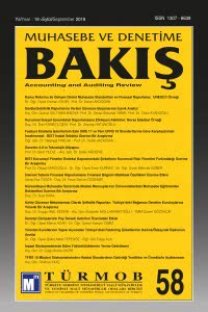SOSYAL MUHASEBENİN UYGULANABİLİRLİĞİ ÜZERİNE DÜŞÜNCELER
Sosyal raporlama, dışsallıkların içselleştirilmesi, saydamlık sistemleri, çıkar sahiplerinin katılımı
REFLECTIONS ON THE PRACTICABILITY OF SOCIAL ACCOUNTING
___
- Belkaoui, A. (1984). Socio-Economic Accounting. Westport-Connecticut: Quorum Books.
- Birkin, F., Edwards P. ve Woodward, D. (2005). Accounting’s contribution to a cultural evolution. Critical Perspectives on Accounting 16.
- Briloff, A.J. (1972). Unaccountable Accounting: Games Accountants Play. New York: Harper and Row Publishers.
- Briloff, A.J. (1976). More Debits than Credits: The Burnt Investor’s Guide to Financial Statements. New York: Harper and Row Publishers.
- Brown, L. ve Hicks, E. (2013). Stakeholder Engagement in the Design of Social Accounting and Reporting Tools. Ed. Mook, L. Accounting for Social Value içinde (ss.85-116). Toronto-Canada: University of Toronto Press.
- Brown, J. (2009). Democracy, sustainability and dialogic accounting technologies. Critical Perspectives on Accounting 20, 313-42.
- Contrafatto, M. ve Bebbington J. (2013). Developing Techniques for Stewardship: A Scottish Study. Ed. Mook, L. Accounting for Social Value içinde (ss. 31-56). Toronto-Canada: University of Toronto Press.
- Gray, R. (2001). 30 years of social accounting, reporting and auditing: What (if anything) have we learned, Business Ethics: A European Review, Volume 10, Number 1, January.
- Jackson, E.T. ve Tarcilla, M. (2013). Mixed Methods in Social Accounting: Evaluating the Micro-Loan Program of Alberta Savings Credit Union. Ed. Mook, L. Accounting for Social Value içinde (ss. 117-38). Toronto-Canada: University of Toronto Press.
- Kandemir, C. (2014). Muhasebenin Ekonomi Politiği: Dış Dinamikler. Gazi Üniversitesi Sosyal Bilimler Dergisi, Cilt: 1, Sayı: 1.
- Kandemir, C. (2019a). Finansallaşmanın Muhasebeye Yansımaları. Çukurova II. Uluslararası Multidisipliner Çalışmalar Kongresi, Haziran, 553-70.
- Kandemir, C. (2019b). Sosyal Muhasebe: Bir Seçenek Var. Innovation and Global Issues Congress V Kongresi, Mayıs, 695-710.
- Macintosh, N. (2005). Accounting, Accountants and Accountability: Poststructuralist Positions”, New York: Routledge.
- McMurtry, J.J., Medalye, J. ve Reed, D. (2013). Environmental, Ethical Trade and Fair Trade Purchasing Policies: Some Challenges of Promoting Sustainability in Canadian Universities. Ed. Mook, L. Accounting for Social Value içinde (ss. 189-229). Toronto-Canada: University of Toronto Press.
- Mook, L ve Pstross, M. (2013). Social Accounting: Lessons Learned for the Road Ahead. Ed. Mook, L. Accounting for Social Value içinde (ss. 249-60). Toronto-Canada: University of Toronto Press.
- Mook, L. (2013). Social Accounting for the Social Economy. Ed. Mook, L. Accounting for Social Value içinde (ss. 5-28). Toronto-Canada: University of Toronto Press.
- Reed D., Mukherjee A., McMurty, J.J. ve Cherkill, M. (2013). Fair Trade Intermediaries and Social Accounting: The Case of Assisi Organics. Ed. Mook, L. Accounting for Social Value içinde (ss. 57-84). Toronto-Canada: University of Toronto Press.
- Ruff, K. (2013). The Role of Intermediaries in Social Accounting: Insights from Effective Transparency Systems. Laurie Mook (Ed.), Accounting for Social Value (ss. 230-48). Toronto: University of Toronto Press.
- Sadownik, B. (2013). The Demonstrating Value Initiative: Social Accounting for Social Enterprises. Ed. Mook, L. Accounting for Social Value içinde (ss. 139-66). Toronto-Canada: University of Toronto Press.
- Tinker, T. (2004). Paper Prophets: Fraudulent Accounting and Failed Audits, Washington DC: Beard Books.
- Tyrrell, T.J. ve Johnston, R.J. (2013). Measuring the Performance of Convention and Visitors Bureaus. Ed. Mook, L. Accounting for Social Value içinde (ss. 167-88). Toronto-Canada: University of Toronto Press.
- ISSN: 1307-6639
- Yayın Aralığı: 3
- Başlangıç: 2000
- Yayıncı: TÜRMOB
AİLE ŞİRKETLERİNDE VEKALET SORUNUNUN İÇ DENETİM SÜREÇLERİNE ETKİSİ: BİR AİLE ŞİRKETİ İNCELEMESİ
FOREKS PİYASALARININ İŞLEYİŞİ VE TÜRKİYE’DE FOREKS PİYASASININ DURUMU
Yıldız ÖZERHAN, Banu SULTANOĞLU
COVİD-19’UN TÜRK BANKACILIK SEKTÖRÜNDEKİ MEVDUAT BANKALARINA ETKİLERİ
STRESİN PERFORMANS ÜZERİNE ETKİSİ: TÜRKİYE’DE KAMU BANKALARI VE ÖZEL BANKALAR ÜZERİNE BİR ARAŞTIRMA
Özgür ATEŞ, Mohammed ALDAWOODL
MUHASEBE ALANINDA GELİŞTİRİLEN UZMAN SİSTEMLER
TÜRKİYE’DE ENTEGRE RAPORLAMA SÜRECİNDE KARŞILAŞILABİLECEK SORUNLARIN TESPİTİNE İLİŞKİN BİR ARAŞTIRMA
